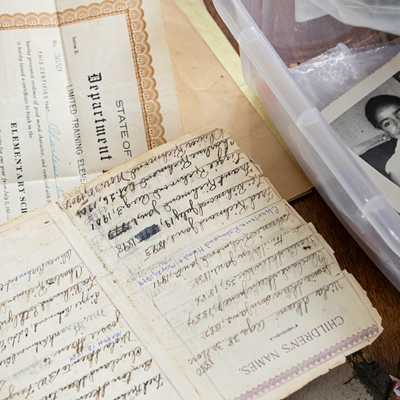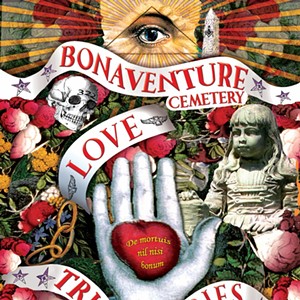The lasting legacy of the comic strip Calvin and Hobbes is explored in Joel Allen Schroeder's documentary Dear Mr. Watterson, screening Saturday, Nov. 2 at the Lucas Theatre.
Cartoonist Bill Watterson does not make an appearance in Schroeder's film; rather, the focus is squarely on the strip he drew from 1985 to 1995, about a rebellious 6-year-old boy with a big imagination, and his stuffed tiger, aka best friend, confidante and co-conspirator.
The vast influence of Watterson's strip is examined and explained by a small army of veteran and contemporary newspaper cartoonists, including Berkeley Breathed (Bloom County), Bill Amand (FoxTrot), Jan Eliot (Stone Soup), Wiley Miller (Non Sequitur), Stephan Pastis (Pearls Before Swine) and Hilary Price (Rhymes with Orange).
Schroeder himself is the film's narrator, a lifelong Calvin and Hobbes devotee who travels to Watterson's Ohio hometown, to speak with his early newspaper co-workers and uncover the roots of his thoughtful, thought-provoking strip.
In one of the film's most compelling sequences, it is revealed that Watterson never allowed any marketing of his characters' likenesses, believing that stuffed Hobbes dolls and Calvin T-shirts would cheapen them.
It transpires that Charles M. Schulz, the late Peanuts creator who was one of Watterson's biggest fans, applauded Watterson's ideals — although, coming from a different generation, Schulz freely licensed his own characters for everything under the sun.
Dear Mr. Watterson also chronicles Watterson's battles to keep the size of his printed artwork from shrinking as newspapers' column inches got smaller.
When he voluntarily retired Calvin and Hobbes after 10 years ("I believe I've done what I can do within the constraints of daily deadlines and small panels"), Watterson had published 3,150 strips, daily, in 2,400 papers around the world.
Nearly 45 million Calvin and Hobbes anthology books have been sold to date.
You funded this through Kickstarter. Was it a hard sell?: "I want to make a film about a beloved comic strip. Give me money."
Joel Allen Schroeder: Not a real hard sell. We were thrilled with the response we got. We were making a movie about something that people from around the world love, so if they watched our video I think people either instantly were on board, or were not. I've always said it was the perfect kind of Kickstarter project. If they were Calvin and Hobbes fans, and they heard about it, they were possibly ready to help support and make the project happen.
And the way I wanted to make the movie, about the impact of the strip, what a perfect piece of evidence to prove that the strip has had such an impact, by funding it from the people that were impacted by the strip.
Is this literally your first film?
Joel Allen Schroeder: It's my first feature film. I graduated from USC in 2002, and for the last seven or eight years I've been working as a freelance editor. Most of the things I work on are not films that I'm directing; they're shorter-form documentary things.
It must be invigorating to make your first feature on something you're really passionate about. And that really comes across in this film.
Joel Allen Schroeder: I think anybody who has made a movie can attest to the fact that making films is hard. It takes a long time, it's not cheap. You finish film school and you're ready to make movies, and the reality is, you also need to make a living. A lot of my fellow graduates and I, we went out into the real world trying to get experience, and pay the bills, and at the same time you're trying to make your own projects. Working on film is groovy, but it's not glamorous, and it's very hard work.
I think what gets most people excited is when they can be creatively involved in projects of their own. Where they can have creative input, where they are contributing. For years, that's what I was hoping to do, make my own film. Ideas come and go, but this was the first idea where it lasted. Where I really felt it was something I was passionate enough about to pursue it for the time it would take to get it made.
Bill Watterson, as you make clear in your film, is notoriously publicity-shy. Did you make any attempt to get him on camera?
Joel Allen Schroeder: If you're going to make a documentary about Calvin and Hobbes, everyone's going to consider, well, would Bill Watterson be available to do an interview? Would he be willing to do an interview? At the beginning we thought, well, we're not going to just close the door on that idea, even though we knew that he preferred his privacy.
I never wanted it to be about a search for Watterson. I never wanted it to be that sort of film. And so we steered clear, wanting to avoid the perception that it was that type of film.
Has Watterson made any sort of comment about your movie?
Joel Allen Schroeder: I get that question a lot. I can tell you that he has seen it, and there's been no sort of thumbs up, thumbs down indicator that we know of.
People who've never seen Calvin and Hobbes have watched it, and they've told me they appreciated learning about the man and the strip. And huge fans who know a lot about him, who have seen the movie, I like to think they still get something out of it.



























